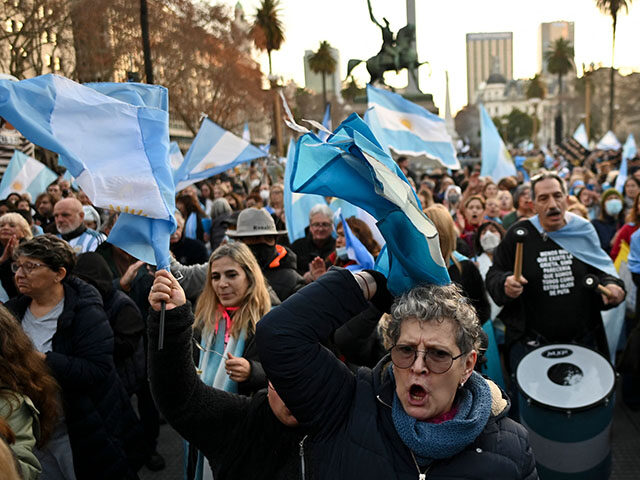Argentina Raids Leftist Protest Groups After Hundreds of Extortion Complaints
 LUIS ROBAYO/AFP via Getty Images
LUIS ROBAYO/AFP via Getty Images
Federal justice authorities in Argentina ordered 27 raids on Monday against leaders of leftist piqueteros (“picketers”) organizations following hundreds of complaints by local citizens of alleged extortion and blackmail.
The complaints reportedly accused the organizations of threatening individuals if they refused to participate in leftist protests against President Javier Milei.
In Argentina, “picketers” are the name given to leftist “social” organizations that mainly dedicate themselves to protest against the government, often in a violent manner. Some of the existing picketer groups are offshoots of local far-left parties, while others have founded their own parties in recent years. Picketer groups have occupied public ministry positions in previous leftist governments.
The now-ongoing investigation, led by Argentine Federal Judge Sebastián Casanello and Prosecutor Gerardo Pollicita, stems from a formal request made by the Argentine government. In December, when Milei took office, the government established a phone hotline that Argentine citizens can use to denounce personal threats made by picketer leaders.
The hotline began receiving complaints one day before the first picketer-organized protest against Milei, which took place on December 20. Since then, there have reportedly been over 13,000 calls, of which 924 have been used to launch formal probes.
Local media published copies of the text message logs from the phone number, featuring texts Argentine prosecutors have presented as evidence of citizens being pressured and extorted by the picketer leaders.
Argentine citizens who are beneficiaries of state assistance programs denounced in the complaints that picketer leaders forced them to hand over a percentage of the stipend money received and threatened to strip them of the government benefits if they did not participate in protests against Milei.
The complaints also included cases of picketers allegedly asking citizens for “justification” if they were not present in a protest and “fining” them for non-participation. Additionally, some of the complaints detailed cases of people being made to pay a “freight” fee to picketer groups to be able to receive food assistance boxes that the government distributes for free, as well as other similar cases of leftist groups imposing spurious “fees” on citizens.
In addition to being forced to participate in the protests against Milei, the investigation found that some citizens were allegedly being forced to sell free food received from the Argentine government to profit the groups, as well as cases of people being forced to distribute political flyers. Failure to comply would allegedly result in threats of being removed from social assistance programs and/or being denied the free food provisions.
The 27 raids and the ongoing investigations are centered around the leaders of three picketer groups: The Workers' Pole; an organization affiliated with the Trotskyist Workers' Party, the Standing Barrios; and the Organizations in Struggle Front.
Argentine newspaper Clarín reported on Monday that audio logs gathered as part of the investigation directly mention picketer leaders affiliated with Kirchnerism, a group of socialists who ruled Argentina for 16 of the past 20 years led by late President Néstor Kirchner and his wife, former President and former Vice President Cristina Fernández de Kirchner.
Most of the targets of the raids are reportedly related to the now-ended Enhance Work social assistance program, which granted individual monetary stipends to low-income citizens. Milei ended the program in February and its beneficiaries were reassigned into two new different assistance programs depending on their case.
Argentine police officials reportedly seized “millions of pesos,” as well as an unspecified amount in U.S. dollars, “cell phones, lists and spreadsheets,” and other “relevant evidentiary elements” during the raids. The 27 raids implicated 28 individuals who will now have to testify to local authorities as part of the ongoing investigation proceedings.
The money obtained from extortion was allegedly channeled through “cooperatives” towards an unknown final destination. As a result, local prosecutors have reportedly requested the lifting of the tax and banking secrecy of all those implicated.
Judicial sources told the Argentine newspaper La Nación that they were able to prove the existence of a “control system” that picketers use to punish individuals who fail to attend the anti-Milei protests. The protest’s organizers allegedly took attendance at both the beginning and end of the protests, drafting a “punished list” of missing people who had to “repair” their absence by either performing different tasks or paying a fine to the leftist leaders.
Pollicita, who is in charge of the investigation, stated that the picketers established a five-tier pyramidal structure classifying beneficiaries of social assistance programs into different levels.
According to the prosecutor, citizens had to complete certain tasks and participate in protests before being able to access the Enhance Work assistance program. Beneficiaries of the program, in turn, were required to continue participating in protests and give money to the picketers to remain in the assistance program.
The third tier, the prosecutor pointed out, was reserved for beneficiaries who received double the amount of the social benefits. They had to perform more tasks in addition to paying the picketers and participate in the protests.
The fourth tier was formed by “delegates,” who sometimes receive “double, triple, or even quadruple” the amount of money from the social programs, and demand money from the regular beneficiaries, collect the fees, and direct the sanctions against those that failed to comply with the group’s demands.
The topmost tier of the pyramid structure was allegedly reserved for “referents,” who directed the actions of the lower delegates, intimidated the victims, and controlled the money collection and the attendance to the protests.
Christian K. Caruzo is a Venezuelan writer and documents life under socialism. You can follow him on Twitter here.
Source link

